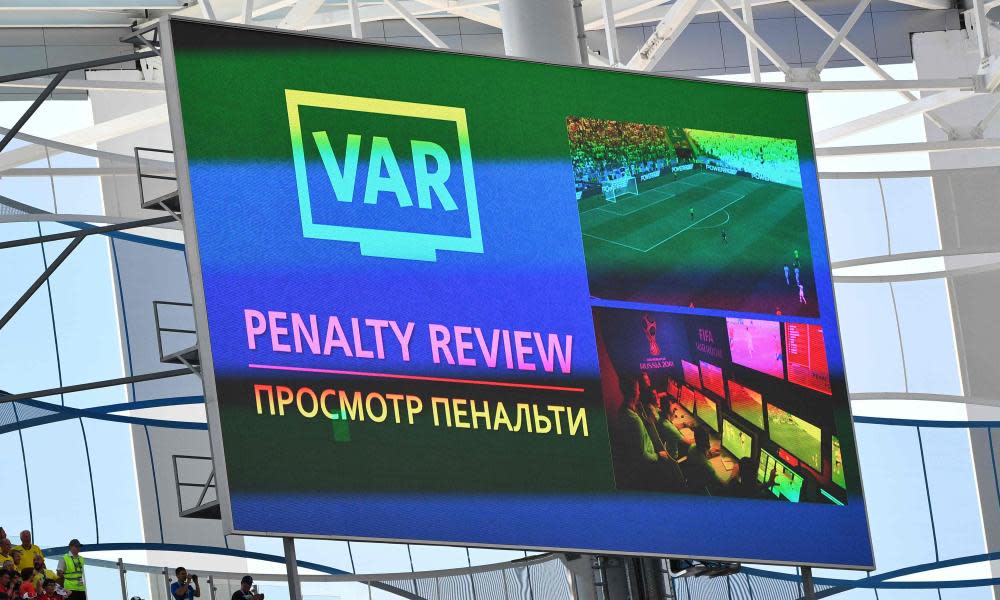The video ref is the rising star of this World Cup. Could it even save humanity?

Like many terrible people, I have certain Strongly Held Opinions that I am inexplicably passionate about. Mel C was the best Spice Girl. Fennel is a bad vegetable. The Nivea advert, where Liverpool footballer James Milner gets into his car and is then inexplicably crushed (to death, we have to assume) by the foot of a dinosaur with absolutely no explanation, is one of the most powerful short films of the 2010s. Since the start of the World Cup, I’ve latched on to a new Strongly Held Opinion, one that I angrily bring up at every opportunity: the new video assistant referee is not just good for football, it is good for society as a whole. In time, VAR will make us kinder and happier. Maybe, just maybe ... VAR can redeem humanity.
If you don’t know, the video assistant referee is a new aspect of the game, where a group of referees, based in a windowless room somewhere in Moscow (the location is never disclosed, probably out of a fear that it would be inundated with screaming VAR-mania fangirls), review the match with the aid of video replays, and alert the referee if he’s made a serious error. It’s dramatic, it’s exciting, and it’s shockingly new (if you haven’t watched a game of rugby or cricket in the past two decades, at least). VAR has been my player of the tournament so far – it’s assisted at least two goals, and it looks like it’s hungry for more. I, for one, am delighted. I’m planning to turn up to a fanzone for the quarter-finals dressed in full assistant referee kit, chanting “VAR! VAR! VAR! VAR!” and waving a little flag that says: “Let’s check it again!”
Of course, there are people who don’t like VAR. Those people are all featured pundits in the hit new ITV post-World Cup show, How Long Can We All Argue About VAR Until Someone Gets An Aneurysm. Most of the ITV pundits seem to think of it as a frivolous extra, which is a bit rich coming from a channel with its own “analysis truck”– a phrase that definitely asks more questions than it answers. Is it an actual truck? Does it solve mysteries on the side? Is Mark Clattenburg being held there against his will? Why does he need to be quarantined? Did he eat at a Zizzi’s in Moscow and everyone just thinks it would be “safer” if he stayed outside?
Sure, there have been a few high-profile mistakes. VAR should have spotted Harry Kane being wrestled to the ground by Tunisia’s defenders last night, and if England hadn’t won the Sun would have run the headline “What a bunch of VARseholes”. But to me, VAR is much more than a silly extra gimmick, or something new and shiny that exists just to irritate Mark Lawrenson – it’s actually changing the dynamic of the sport.
In a normal match of football, referees have to be infallible. They are sort of like a dictator of an oppressive regime – their decision is always correct, regardless of how baffling that decision is. Everyone knows Maradona used his hand to score in the quarter-finals of World Cup 1986, but officially, according to Fifa, he used his head, because the referee of that match said so. And like a dictator, this amount of power can lead to paranoia: any time a player remonstrates with him, the referee doesn’t know whether he’s doing so because the player is trying to cheat the system or because the referee has genuinely made a hugely embarrassing gaffe that will get them lambasted in mediocre Channel 5 football countdowns for years to come.
But if a referee knows they can review a decision, it becomes inherently less arbitrary. As such, everyone has more faith in the system, so there are fewer frustrated outbursts, and less of a need for a referee to stamp their authority on the game. That’s borne out by the stats: with no red cards in the first 14 matches, this is officially the cleanest start to a World Cup in 32 years.
VAR allows referees to be imperfect, and in doing so promotes a vaguely revolutionary idea – that it’s OK for an authority figure to change their mind when presented with new information. In current politics, politicians and pundits are praised with picking a position and steadfastly sticking to it – any admission of nuance or fallibility is leapt on as a sign of weakness. That’s why the prime minister is still claiming there’s a Brexit dividend, even when every financial expert in the country has told her there’s not – better to be strong and wrong, than weak and correct. But in a strange way, VAR shows us that there’s strength, in the long run, in owning up to mistakes. If we stop equating them with weakness, and allow everyone to admit that they are human, we’ll have a less divided, less bitter society. Truly, we can make this place a nirVARna.
• Jack Bernhardt is a comedy writer and performer

 Yahoo News
Yahoo News 
